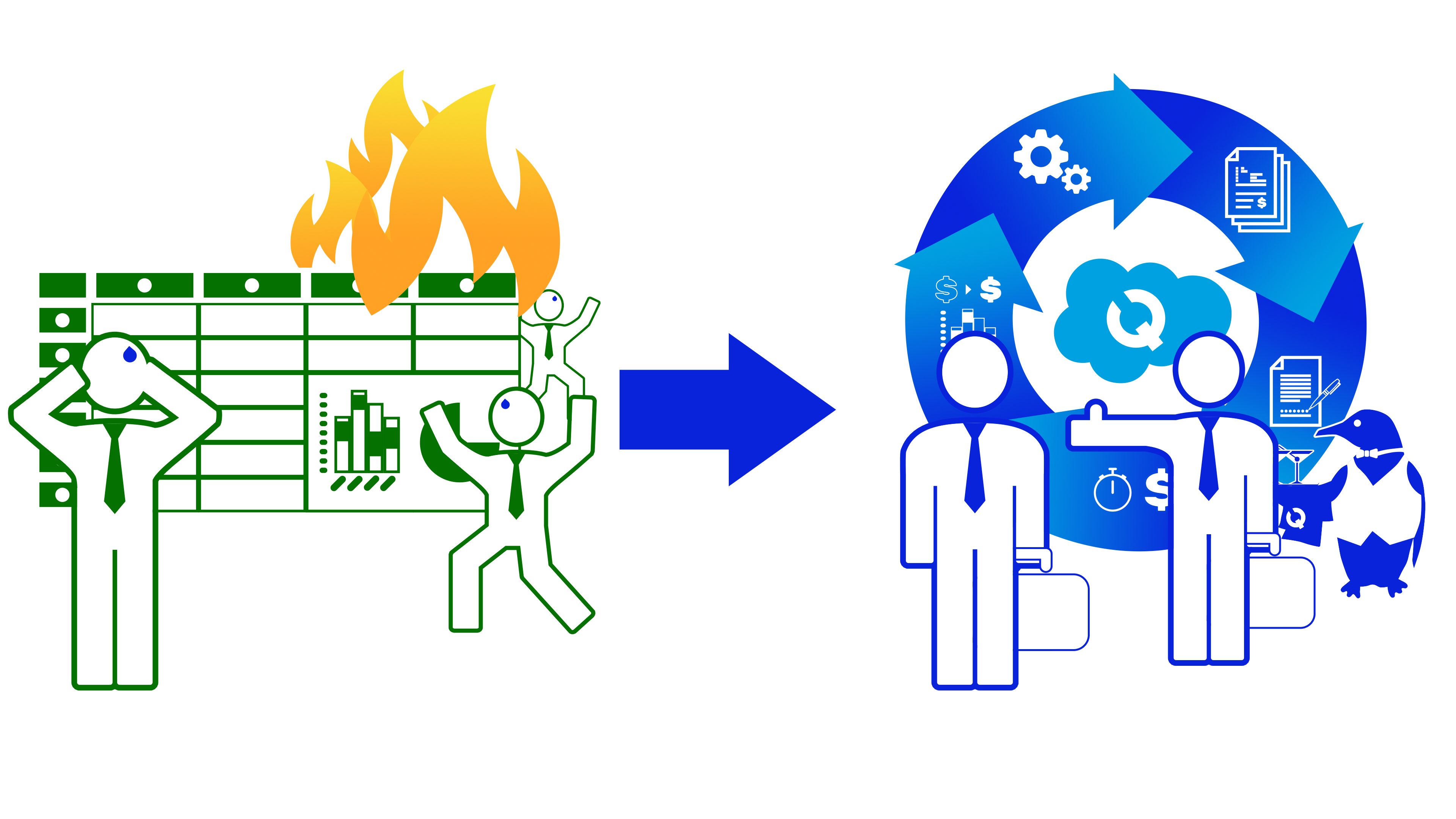
Unleashing Efficiency and Collaboration in Organizations with a Services Quoting Tool
Introduction
The quoting process serves as a critical junction where sales, services, and customers converge. Here, the right tool can make or break business opportunities and customer satisfaction.
Businesses need a dedicated ‘services quoting tool’, purpose-built to address the unique complexities of service-based quoting. It alone holds the key to unlocking maximum efficiency, accuracy, and collaboration in this vital business function.
A services quoting tool or sometimes called a services CPQ enables organizations to navigate sophisticated service offering management, accommodate diverse pricing models, and optimize resource allocation and scheduling. In the end, it ensures a seamless transition to the delivery team.
In this article, we’ll:
- Explore the signs that indicate readiness for a quoting tool
- Discuss the limitations of spreadsheets
- Contrast CPQ tool features to essential elements of a top-notch services CPQ tool
- Reveal the hidden costs organizations pay by not investing in a robust solution
By understanding these factors, organizations can unlock new levels of efficiency, accuracy, savings, and success in the quoting process.
Signs an Organization is Ready for a Services CPQ
Organizations must first identify the signs of readiness for a robust quoting tool. Increasing complexity, time-consuming processes, high quoting volumes, customization requirements, lack of standardization, growth and scalability aspirations, and growing competitive pressures all signify an organization’s need for a robust quoting tool.
These indicators highlight the need to transition from manual methods to automated solutions. Such solutions can handle complex pricing options and evolving business demands, within the limits of predefined offers.
Why Quoting Services in a Spreadsheet Doesn’t Work
You may ask yourself, “What’s wrong with my massive Excel Spreadsheet?”. While spreadsheets with macros (and built-in security) may offer some functionality for quoting, they have many shortcomings.
Massive spreadsheets typically
- become cumbersome to manage and maintain
- lack centralized control
- struggle with scalability
- pose security risks
- hinder collaboration
- and offer limited automation and integration capabilities.
As the quoting process evolves or requires updates, the shortcomings above are magnified and the following can happen:
- Modifying formulas, macros, or security measures in a large multi-sheet workbook introduces complexity and increases the risk of inconsistencies and errors.
- Centralized control breaks down when different team members develop different versions of the spreadsheet. This interferes with tracking changes and disrupts version control. Which results in errors, miscommunications, and delays in the quoting process.
- Managing simultaneous access and resolving document control conflicts becomes difficult, particularly when the quoting process involves multiple teams accessing quotes & quote documents.
Plus, organizations normally depend on “that one expert” to keep those spreadsheets going, expecting him/her to delay vacations and never be sick. It’s easy to see why you shouldn’t quote services in a spreadsheet.
Eventually, an inevitable conclusion arises: Dedicated quoting tools designed specifically for services will outperform spreadsheets.
While spreadsheets can work for simpler quoting processes or smaller organizations, they become inefficient, error-prone, and challenging to scale as the complexity and volume of quoting requirements increase.
Dedicated quoting tools offer specialized features, scalability, enhanced security, collaboration capabilities, automation, and reporting functionalities specifically designed to streamline the quoting process and support business growth.
So why can’t I use a traditional CPQ tool?
It’s pretty clear to see why quoting in spreadsheets doesn’t work but what about traditional, product-oriented CPQ tools? It’s true — traditional CPQ tools primarily excel in handling complex product configurations and pricing. However, those tools may not prove the ideal choice for quoting services for the following reasons:
1: Limited Service-Specific Functionality
Tools focused on product-based quoting lack specific features tailored to service-based quoting. It may not provide the necessary flexibility and functionality to handle the intricacies and variations involved in quoting services, such as resource allocation, time-based pricing, or project-based quoting.
2: Pricing Model Limitations
Product-based CPQ tools may not support pricing models commonly used in service industries. These tools often use product-based pricing structures, such as list prices, discounts, or volume-based pricing. Service-based pricing models, such as hourly rates, project-based pricing, or offer-based pricing, may not accommodate services well or may require extensive customization.
3: Resource Allocation and Scheduling
Quoting services often involve resource allocation and scheduling considerations, such as assigning specific personnel or teams to projects or service engagements. Product-based CPQ tools typically lack the features necessary to handle resource allocation and scheduling functionalities. However accurate and efficient service-based quoting requires such a function. This alone is a deal breaker.
4: Limited Service Catalog Capabilities
Service catalogs can bring more complexity than product catalogs, as they often involve a variety of service offerings, customizations, options, and service bundles. This structure differs entirely from a product bundle.
5: Modification Issues
Adapting product-based CPQ tools for service-based quoting may require extensive customization and development effort. Services often involve unique requirements, complex pricing structures, or specialized business rules. Modifying a CPQ tool to handle these service-specific needs increases complexity, cost, and time invested.
6: Integration Challenges
If your organization relies on a PSA tool for resource management, project management, or service delivery, integrating those systems with a product-based CPQ app for a seamless end-to-end service quoting process may present challenges, often requiring custom development or additional integrations.
While product-based CPQ tools deliver powerful functionality for product-based quoting and sales automation, organizations that primarily offer services will find it more suitable to explore dedicated service quoting tools or industry-specific solutions that are designed to address the unique requirements and complexities of service-based quoting, resource allocation, scheduling, and project creation.
Essential Features of a great Services Quoting Tool
A comprehensive services quoting tool should possess essential elements to maximize quoting efficiency and collaboration while minimizing reprocessing and duplicate data entry. These elements include
- service catalog management to configure offerings and options
- support for diverse pricing models
- resource allocation and scheduling capabilities
- task planning
- some level of contract management functionalities
- and seamless integration with your PSA system.
Finally, the Hidden Costs of Not Having a Robust Services CPQ Tool
Organizations that continue to rely on manual methods or inadequate quoting tools may overlook the hidden costs incurred. These costs manifest in various ways, such as:
- increased errors and inaccuracies in quotes
- time wasted on manual calculations and data entry
- lost revenue due to delayed (or poorly scoped) quote generation
- inefficient resource allocation leading to missed opportunities
- poor collaboration between sales and services teams causing customer dissatisfaction
- and limited visibility into quoting performance for strategic decision-making
These hidden costs can significantly impact profitability, customer relationships, and overall business growth.
By implementing a robust services CPQ tool, organizations can accelerate sales cycles, improve quoting accuracy, reduce duplicate data entry, boost customer satisfaction, achieve cost savings, and gain a competitive edge.
In Closing
In today’s environment, having a robust services quoting tool is not just a luxury; it’s a necessity. Investing in a top-notch services CPQ tool is imperative for service organizations aiming to excel in today’s competitive landscape.
By recognizing the signs of readiness, understanding the limitations of spreadsheets, prioritizing the essential elements of a services CPQ tool, and considering the hidden costs incurred without one, organizations can unleash efficiency, accuracy, cost savings, collaboration, and success in the quoting process. Investing in a purpose-built tool enables businesses to navigate complexities, optimize pricing strategies, allocate resources intelligently, reduce hidden costs, and elevate their quoting performance. Embrace the power of a robust services CPQ tool, and embark on a journey toward mastering the art of services quoting!
